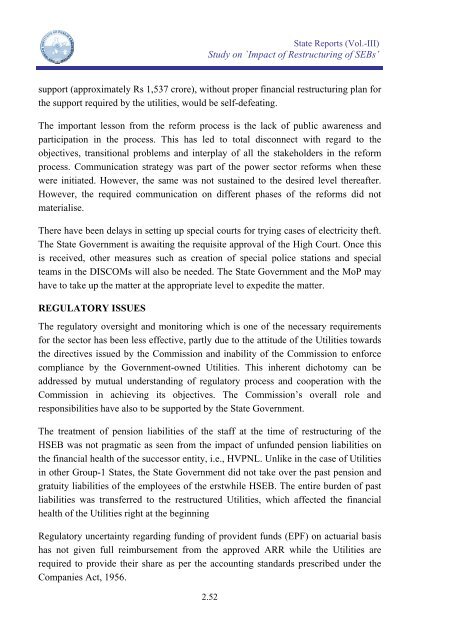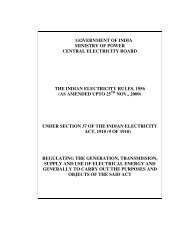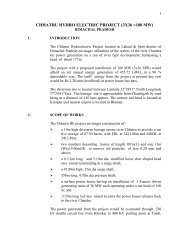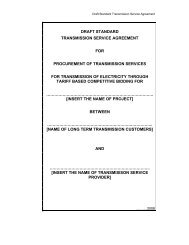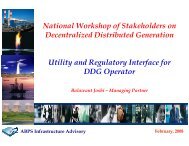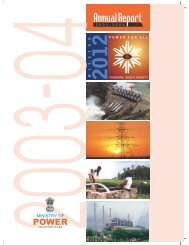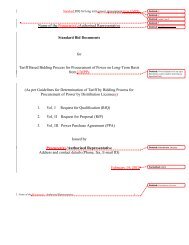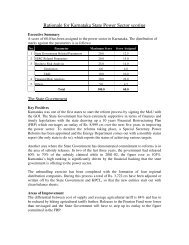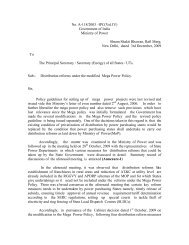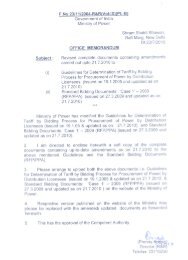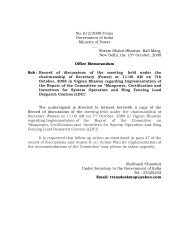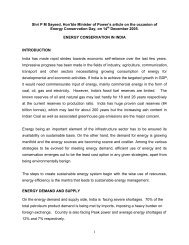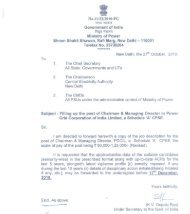- Page 2 and 3:
FOREWORD Electricity is the most ve
- Page 4 and 5:
PREFACE The country has been regist
- Page 6 and 7:
Performance of Generating Companies
- Page 8 and 9:
S.No. Parameter Uttar Pradesh - 199
- Page 10 and 11:
Voltage Level 400 kV 220 kV Annexur
- Page 12 and 13:
Transmission Sub-Station Capacity A
- Page 14 and 15:
Parameter 1995-96 1996-97 1997-98 1
- Page 16 and 17:
Parameter 1995-96 1996-97 1997-98 1
- Page 18 and 19:
STATES/UTs 1990-91 1991-92 1992-93
- Page 20 and 21:
Commercial Profit/Loss (with Subsid
- Page 22 and 23:
Rs crore 45000 40000 35000 30000 25
- Page 24 and 25:
Rs crore 60 50 40 30 20 10 % of Los
- Page 26 and 27:
Percentage Commercial Losses of Sta
- Page 28 and 29:
Percentage 25 20 15 10 5 0 -5 Perce
- Page 30 and 31:
Per Capita Consumption of Electrici
- Page 32 and 33:
Percentage 70.00 60.00 50.00 40.00
- Page 34:
CONTENTS Executive Summary.........
- Page 39 and 40:
National Report (Vol.-II) Study on
- Page 41 and 42:
National Report (Vol.-II) Study on
- Page 43 and 44:
National Report (Vol.-II) Study on
- Page 45 and 46:
National Report (Vol.-II) Study on
- Page 47 and 48:
National Report (Vol.-II) Study on
- Page 49 and 50:
National Report (Vol.-II) Study on
- Page 51 and 52:
National Report (Vol.-II) Study on
- Page 53 and 54:
National Report (Vol.-II) Study on
- Page 55 and 56:
National Report (Vol.-II) Study on
- Page 57 and 58:
National Report (Vol.-II) Study on
- Page 59 and 60:
National Report (Vol.-II) Study on
- Page 61 and 62:
6.27 Encouragement to Non-Conventio
- Page 63 and 64:
CHAPTER - 2 WAY FORWARD Way Forward
- Page 65 and 66:
National Report (Vol.-II) Study on
- Page 67 and 68:
National Report (Vol.-II) Study on
- Page 69 and 70:
National Report (Vol.-II) Study on
- Page 72 and 73:
1 INTRODUCTION ANDHRA PRADESH EXECU
- Page 74 and 75:
Andhra Pradesh The bulk supply trad
- Page 76 and 77:
Andhra Pradesh 1.5.3 Distribution 2
- Page 78 and 79:
Andhra Pradesh 1.5.5 Customer Servi
- Page 80 and 81:
Andhra Pradesh CHAPTER 1 GENERAL FI
- Page 82 and 83:
Andhra Pradesh publicity campaign u
- Page 84 and 85:
Andhra Pradesh • Standards of per
- Page 86 and 87:
Andhra Pradesh individuals but by o
- Page 88 and 89:
Andhra Pradesh • Improved custome
- Page 90 and 91:
Andhra Pradesh 2.1 INTRODUCTION CHA
- Page 92 and 93:
Andhra Pradesh • Tariff for agric
- Page 94 and 95:
Andhra Pradesh APTRANSCO handled th
- Page 96 and 97:
State Reports (Vol.-III) Study on `
- Page 98 and 99:
4.1 GENERATION State Reports (Vol.-
- Page 100 and 101:
4.1.2 Operational Efficiency State
- Page 102 and 103:
State Reports (Vol.-III) Study on `
- Page 104 and 105:
State Reports (Vol.-III) Study on `
- Page 106 and 107:
State Reports (Vol.-III) Study on `
- Page 108 and 109:
4.3.5 Billing and Collection State
- Page 110 and 111:
State Reports (Vol.-III) Study on `
- Page 112 and 113:
4.3.10 Network Development State Re
- Page 114 and 115:
State Reports (Vol.-III) Study on `
- Page 116 and 117:
State Reports (Vol.-III) Study on `
- Page 118 and 119:
4.3.15 Power supply to Agricultural
- Page 120 and 121:
State Reports (Vol.-III) Study on `
- Page 122 and 123:
State Reports (Vol.-III) Study on `
- Page 124:
TABLE OF CONTENTS EXECUTIVE SUMMARY
- Page 127 and 128:
State Reports (Vol.-III) Study on `
- Page 129 and 130:
State Reports (Vol.-III) Study on `
- Page 131 and 132:
State Reports (Vol.-III) Study on `
- Page 133 and 134:
State Reports (Vol.-III) Study on `
- Page 135 and 136:
State Reports (Vol.-III) Study on `
- Page 137 and 138:
State Reports (Vol.-III) Study on `
- Page 139 and 140:
State Reports (Vol.-III) Study on `
- Page 141 and 142:
State Reports (Vol.-III) Study on `
- Page 143 and 144:
State Reports (Vol.-III) Study on `
- Page 145 and 146:
State Reports (Vol.-III) Study on `
- Page 147 and 148:
State Reports (Vol.-III) Study on `
- Page 149 and 150:
State Reports (Vol.-III) Study on `
- Page 151 and 152:
STATUS OF PERSONNEL DISPERSAL Estab
- Page 153 and 154:
State Reports (Vol.-III) Study on `
- Page 155 and 156:
State Reports (Vol.-III) Study on `
- Page 157 and 158:
State Reports (Vol.-III) Study on `
- Page 159 and 160:
State Reports (Vol.-III) Study on `
- Page 161 and 162:
State Reports (Vol.-III) Study on `
- Page 163 and 164:
State Reports (Vol.-III) Study on `
- Page 165 and 166:
State Reports (Vol.-III) Study on `
- Page 167 and 168:
State Reports (Vol.-III) Study on `
- Page 169 and 170:
State Reports (Vol.-III) Study on `
- Page 171 and 172:
State Reports (Vol.-III) Study on `
- Page 173 and 174:
State Reports (Vol.-III) Study on `
- Page 175 and 176:
TABLE OF CONTENTS EXECUTIVE SUMMARY
- Page 177 and 178:
GENERAL MADHYA PRADESH EXECUTIVE SU
- Page 179 and 180:
Madhya Pradesh Liabilities Taken Ov
- Page 181 and 182:
Madhya Pradesh to high level of emi
- Page 183 and 184:
Madhya Pradesh Collection Efficienc
- Page 185 and 186:
Madhya Pradesh in 27 divisions of s
- Page 187 and 188:
Madhya Pradesh 2,940 MW of generati
- Page 189 and 190:
Madhya Pradesh 1. GENERAL OVERVIEW
- Page 191 and 192:
Madhya Pradesh Pradesh, but functio
- Page 193 and 194:
Madhya Pradesh 1.5.1 Key Features o
- Page 195 and 196:
Madhya Pradesh Details of FRP for t
- Page 197 and 198:
Madhya Pradesh 1.7.1 Functions of t
- Page 199 and 200:
Madhya Pradesh (b) All the cash col
- Page 201 and 202:
Madhya Pradesh 2. GENERATION 2.1 MA
- Page 203 and 204:
Madhya Pradesh on R&M activities to
- Page 205 and 206:
Madhya Pradesh 3200 3150 3100 3050
- Page 207 and 208:
Madhya Pradesh • A number of MOUs
- Page 209 and 210:
Madhya Pradesh 3.2 OPERATIONAL PARA
- Page 211 and 212:
Madhya Pradesh addition and strengt
- Page 213 and 214:
Madhya Pradesh 3.7.2 Transmission C
- Page 215 and 216:
Madhya Pradesh DISCOM wise Energy R
- Page 217 and 218:
Madhya Pradesh 2000-01 to 79 per ce
- Page 219 and 220:
Madhya Pradesh 4.1.3 Subsidy Suppor
- Page 221 and 222:
Madhya Pradesh While MPERC, in the
- Page 223 and 224:
Madhya Pradesh The State Government
- Page 225 and 226:
Madhya Pradesh Due intelligence and
- Page 227 and 228:
Madhya Pradesh 7. Electricity Act 2
- Page 229 and 230:
Madhya Pradesh In regard with the R
- Page 231 and 232:
Madhya Pradesh 8.5.2 Directives Iss
- Page 233 and 234:
Madhya Pradesh agricultural consume
- Page 235 and 236:
Madhya Pradesh and rationalisation
- Page 237 and 238:
Madhya Pradesh is felt that the int
- Page 239:
TABLE OF CONTENTS Background ......
- Page 242 and 243:
State Reports (Vol.-III) Study on `
- Page 244 and 245:
C. Employees Considerations State R
- Page 246 and 247:
State Reports (Vol.-III) Study on `
- Page 248 and 249:
Nov. 1995 The Orissa Electricity Re
- Page 250 and 251:
State Reports (Vol.-III) Study on `
- Page 252 and 253:
State Reports (Vol.-III) Study on `
- Page 254 and 255:
State Reports (Vol.-III) Study on `
- Page 256 and 257:
State Reports (Vol.-III) Study on `
- Page 258 and 259:
State Reports (Vol.-III) Study on `
- Page 260 and 261:
State Reports (Vol.-III) Study on `
- Page 262 and 263:
State Reports (Vol.-III) Study on `
- Page 264 and 265:
State Reports (Vol.-III) Study on `
- Page 266 and 267:
State Reports (Vol.-III) Study on `
- Page 268 and 269:
State Reports (Vol.-III) Study on `
- Page 270 and 271:
State Reports (Vol.-III) Study on `
- Page 272 and 273:
State Reports (Vol.-III) Study on `
- Page 274 and 275:
State Reports (Vol.-III) Study on `
- Page 276 and 277:
State Reports (Vol.-III) Study on `
- Page 278 and 279:
State Reports (Vol.-III) Study on `
- Page 280 and 281:
Particulars State Reports (Vol.-III
- Page 282 and 283:
State Reports (Vol.-III) Study on `
- Page 284 and 285:
State Reports (Vol.-III) Study on `
- Page 287 and 288:
1 INTRODUCTION ASSAM RESTRUCTURING
- Page 289 and 290:
Assam supply bottlenecks and low qu
- Page 291 and 292:
Assam (i) To supply adequate quanti
- Page 293 and 294:
Assam payment to the existing pensi
- Page 295 and 296:
Assam About 1.61 lakh below poverty
- Page 297 and 298:
Assam associated TCS on this assign
- Page 299 and 300:
Assam Table: Financial Settlement a
- Page 301 and 302:
Assam The Strategy is also to have
- Page 303 and 304:
Assam to achieve 100 per cent elect
- Page 305 and 306:
Assam 12.2 State Government Policy
- Page 307 and 308:
Assam The Report is based on the in
- Page 309 and 310: DISTRIBUTION SYSTEM................
- Page 311 and 312: State Reports (Vol.-III) Study on `
- Page 313 and 314: DISTRIBUTION Key Concerns State Rep
- Page 315 and 316: State Reports (Vol.-III) Study on `
- Page 317 and 318: HARYANA STATE PROFILE 2 State Repor
- Page 319 and 320: State Reports (Vol.-III) Study on `
- Page 321 and 322: State Reports (Vol.-III) Study on `
- Page 323 and 324: State Reports (Vol.-III) Study on `
- Page 325 and 326: State Reports (Vol.-III) Study on `
- Page 327 and 328: State Reports (Vol.-III) Study on `
- Page 329 and 330: State Reports (Vol.-III) Study on `
- Page 331 and 332: 4000 3500 3000 2500 2000 1500 1000
- Page 333 and 334: Demand Projections State Reports (V
- Page 335 and 336: Short Term/ Unscheduled Interchange
- Page 337 and 338: State Reports (Vol.-III) Study on `
- Page 339 and 340: State Reports (Vol.-III) Study on `
- Page 341 and 342: State Reports (Vol.-III) Study on `
- Page 343 and 344: % Damage 30.0% 25.0% 20.0% 15.0% 10
- Page 345 and 346: Theft Reduction Measures State Repo
- Page 347 and 348: State Reports (Vol.-III) Study on `
- Page 349 and 350: ACS* State Reports (Vol.-III) Study
- Page 351 and 352: Capital Expenditure State Reports (
- Page 353 and 354: Collection State Reports (Vol.-III)
- Page 355 and 356: State Reports (Vol.-III) Study on `
- Page 357 and 358: Directives Issued by the Commission
- Page 359: State Reports (Vol.-III) Study on `
- Page 363 and 364: State Reports (Vol.-III) Study on `
- Page 365 and 366: State Reports (Vol.-III) Study on `
- Page 367 and 368: DISTRIBUTION State Reports (Vol.-II
- Page 369 and 370: State Reports (Vol.-III) Study on `
- Page 371 and 372: There are wide variations in the tr
- Page 373 and 374: 2.70 Annexure-III
- Page 375 and 376: Power Utility Project name APDRP po
- Page 378 and 379: BACKGROUND GUJARAT Till the year 19
- Page 380 and 381: Gujarat assets transferred to it fr
- Page 382 and 383: Gujarat • The transfers of the pe
- Page 384 and 385: Gujarat communication to employees
- Page 386 and 387: Gujarat The following table gives f
- Page 388 and 389: Gujarat OTHER IMPORTANT SUPPORTING
- Page 390 and 391: Gujarat NOTEWORTHY INITIATIVES IN P
- Page 392 and 393: Gujarat It has opened up a number o
- Page 394 and 395: Gujarat • GSECL 8 Power stations
- Page 396 and 397: Gujarat E-URJA PROJECT This is yet
- Page 398 and 399: Gujarat OTHER ACTION POINTS In the
- Page 400 and 401: Gujarat Investments Made to Improve
- Page 402 and 403: Gujarat Investments Made to Improve
- Page 404 and 405: Gujarat Performance Parameters of D
- Page 406 and 407: Gujarat Category of connection % Ch
- Page 408 and 409: Gujarat Details of Arrears of Reven
- Page 410 and 411:
Gujarat Payment of bills is accepte
- Page 412 and 413:
Gujarat Important Data about Indivi
- Page 414 and 415:
Gujarat Paschim Gujarat Vij Company
- Page 416:
TABLE OF CONTENTS EXECUTIVE SUMMARY
- Page 419 and 420:
State Reports (Vol.-III) Study on `
- Page 421 and 422:
State Reports (Vol.-III) Study on `
- Page 423 and 424:
State Reports (Vol.-III) Study on `
- Page 425 and 426:
State Reports (Vol.-III) Study on `
- Page 427 and 428:
State Reports (Vol.-III) Study on `
- Page 429 and 430:
State Reports (Vol.-III) Study on `
- Page 431 and 432:
INTRODUCTION State Reports (Vol.-II
- Page 433 and 434:
State Reports (Vol.-III) Study on `
- Page 435 and 436:
Highlights of the Transfer Scheme S
- Page 437 and 438:
Adjustments in current liabilities
- Page 439 and 440:
GENERAL COMMENTS State Reports (Vol
- Page 441 and 442:
State Reports (Vol.-III) Study on `
- Page 443 and 444:
Ageing of Generating Units State Re
- Page 445 and 446:
Proposed Capacity Additions State R
- Page 447 and 448:
State Reports (Vol.-III) Study on `
- Page 449 and 450:
State Reports (Vol.-III) Study on `
- Page 451 and 452:
State Reports (Vol.-III) Study on `
- Page 453 and 454:
DISTRIBUTION Introduction State Rep
- Page 455 and 456:
State Reports (Vol.-III) Study on `
- Page 457 and 458:
Consumer category and consumption s
- Page 459 and 460:
State Reports (Vol.-III) Study on `
- Page 461 and 462:
State Reports (Vol.-III) Study on `
- Page 463 and 464:
Billing and Collection Efficiency P
- Page 465 and 466:
State Reports (Vol.-III) Study on `
- Page 467 and 468:
State Reports (Vol.-III) Study on `
- Page 469 and 470:
State Reports (Vol.-III) Study on `
- Page 471 and 472:
Year State Reports (Vol.-III) Study
- Page 473 and 474:
State Reports (Vol.-III) Study on `
- Page 476 and 477:
INTRODUCTION TAMIL NADU The Tamil N
- Page 478 and 479:
Tamil Nadu Financial Position of th
- Page 480 and 481:
Tamil Nadu Strengths of the Board T
- Page 482 and 483:
Tamil Nadu Board and the Government
- Page 484 and 485:
Tamil Nadu obligations of all the p
- Page 486 and 487:
Tamil Nadu • The progress in rura
- Page 488 and 489:
Tamil Nadu What is the energy cost
- Page 490 and 491:
Billing efficiency Tamil Nadu Detai
- Page 492 and 493:
Tamil Nadu Preventive action and pr
- Page 494 and 495:
Tamil Nadu iv) Information received
- Page 496 and 497:
Tamil Nadu Service to Consumers i)
- Page 498 and 499:
Tamil Nadu Reform Measures Action t
- Page 500:
TABLE OF CONTENTS Background ......
- Page 503 and 504:
iii) Bakreswar TPP Units 4 and 5 (2
- Page 505 and 506:
POWER UTILITIES IN THE STATE WBPDCL
- Page 507 and 508:
State Reports (Vol.-III) Study on `
- Page 509:
TABLE OF CONTENTS RESPONSES FROM ST
- Page 512 and 513:
State Reports (Vol.-III) Study on `
- Page 514 and 515:
PROGRESS OF REFORMS State Reports (
- Page 516 and 517:
State Reports (Vol.-III) Study on `
- Page 518 and 519:
State Reports (Vol.-III) Study on `
- Page 520 and 521:
State Reports (Vol.-III) Study on `
- Page 522 and 523:
COMMENTS State Reports (Vol.-III) S
- Page 524 and 525:
State Reports (Vol.-III) Study on `
- Page 526 and 527:
State Reports (Vol.-III) Study on `
- Page 528 and 529:
DISTRIBUTION LOSSES 1995-96 1996-97
- Page 530 and 531:
State Reports (Vol.-III) Study on `
- Page 532 and 533:
BILLING AND COLLECTION EFFICIENCY C
- Page 534 and 535:
State Reports (Vol.-III) Study on `
- Page 536 and 537:
State Reports (Vol.-III) Study on `
- Page 538 and 539:
COMMENTS State Reports (Vol.-III) S
- Page 540 and 541:
Year-wise Position of Loans Raised
- Page 542 and 543:
State Reports (Vol.-III) Study on `
- Page 544 and 545:
State Reports (Vol.-III) Study on `
- Page 546 and 547:
State Reports (Vol.-III) Study on `
- Page 548 and 549:
State Reports (Vol.-III) Study on `
- Page 550 and 551:
State Reports (Vol.-III) Study on `
- Page 552 and 553:
State Reports (Vol.-III) Study on `
- Page 554 and 555:
State Reports (Vol.-III) Study on `
- Page 556 and 557:
State Reports (Vol.-III) Study on `
- Page 558 and 559:
State Reports (Vol.-III) Study on `
- Page 560 and 561:
Direct jurisdiction of Ombudsman in
- Page 562 and 563:
State Reports (Vol.-III) Study on `
- Page 564 and 565:
State Reports (Vol.-III) Study on `
- Page 566 and 567:
DISTRIBUTION Professional Directors
- Page 568 and 569:
State Reports (Vol.-III) Study on `
- Page 571 and 572:
OBJECTIVE OF REFORMS EXECUTIVE SUMM
- Page 573 and 574:
Uttar Pradesh auxiliary consumption
- Page 575 and 576:
Uttar Pradesh one-man-one-post to f
- Page 577 and 578:
Uttar Pradesh The power sector refo
- Page 579 and 580:
Uttar Pradesh In the second phase o
- Page 581 and 582:
Uttar Pradesh GENERATION SECTOR OVE
- Page 583 and 584:
Uttar Pradesh CGS Stations Capacity
- Page 585 and 586:
Uttar Pradesh Sec. Oil Consumption
- Page 587 and 588:
Uttar Pradesh TRANSMISSION AND DIST
- Page 589 and 590:
Uttar Pradesh been increasing consi
- Page 591 and 592:
Uttar Pradesh The State should also
- Page 593 and 594:
Uttar Pradesh The figures of distri
- Page 595 and 596:
Uttar Pradesh SUBSIDY SUPPORT FROM
- Page 597 and 598:
Uttar Pradesh 2500 2000 1500 1000 5
- Page 599 and 600:
Uttar Pradesh Particulars Financial
- Page 601 and 602:
Uttar Pradesh created under the fir
- Page 603 and 604:
Transformation Capacity at Grid Sub
- Page 605 and 606:
GROUP-1 STATES SYNOPSIS OF STATE RE
- Page 607 and 608:
Synopsis of State Reports (Vol.-IV)
- Page 609 and 610:
Synopsis of State Reports (Vol.-IV)
- Page 611 and 612:
Operational Efficiency Synopsis of
- Page 613 and 614:
Synopsis of State Reports (Vol.-IV)
- Page 615 and 616:
Synopsis of State Reports (Vol.-IV)
- Page 617 and 618:
Synopsis of State Reports (Vol.-IV)
- Page 619 and 620:
2.1.1 Chronology of Restructuring S
- Page 621 and 622:
2.2.4 Financial Parameters Key Conc
- Page 623 and 624:
Synopsis of State Reports (Vol.-IV)
- Page 625 and 626:
Anti Theft Measures Synopsis of Sta
- Page 627 and 628:
Synopsis of State Reports (Vol.-IV)
- Page 629 and 630:
Synopsis of State Reports (Vol.-IV)
- Page 631 and 632:
Synopsis of State Reports (Vol.-IV)
- Page 633 and 634:
Synopsis of State Reports (Vol.-IV)
- Page 635 and 636:
3.11 ACHIEVEMENTS OF THE NEW COMPAN
- Page 637 and 638:
Synopsis of State Reports (Vol.-IV)
- Page 639 and 640:
Synopsis of State Reports (Vol.-IV)
- Page 641 and 642:
Synopsis of State Reports (Vol.-IV)
- Page 643 and 644:
Synopsis of State Reports (Vol.-IV)
- Page 645 and 646:
Synopsis of State Reports (Vol.-IV)
- Page 647 and 648:
Synopsis of State Reports (Vol.-IV)
- Page 649 and 650:
Synopsis of State Reports (Vol.-IV)
- Page 651 and 652:
Synopsis of State Reports (Vol.-IV)
- Page 653 and 654:
Synopsis of State Reports (Vol.-IV)
- Page 655 and 656:
5.2 METHODOLOGY ADOPTED Synopsis of
- Page 657 and 658:
Synopsis of State Reports (Vol.-IV)
- Page 659 and 660:
Synopsis of State Reports (Vol.-IV)
- Page 661 and 662:
Synopsis of State Reports (Vol.-IV)
- Page 663 and 664:
Synopsis of State Reports (Vol.-IV)
- Page 665 and 666:
5.6 OERC and the DISCOMs Synopsis o
- Page 667 and 668:
Synopsis of State Reports (Vol.-IV)
- Page 670 and 671:
CHAPTER - 6 RAJASTHAN 6.1 BACKGROUN
- Page 672 and 673:
Synopsis of State Reports (Vol.-IV)
- Page 674 and 675:
Preventive raids (No.) Demand raise
- Page 676 and 677:
1993 -94 Synopsis of State Reports
- Page 678 and 679:
Synopsis of State Reports (Vol.-IV)
- Page 680 and 681:
Synopsis of State Reports (Vol.-IV)
- Page 682 and 683:
CHAPTER - 7 UTTAR PRADESH 7.1 FACTO
- Page 684 and 685:
Synopsis of State Reports (Vol.-IV)
- Page 686 and 687:
Synopsis of State Reports (Vol.-IV)
- Page 688 and 689:
Synopsis of State Reports (Vol.-IV)
- Page 690 and 691:
Synopsis of State Reports (Vol.-IV)
- Page 692 and 693:
Synopsis of State Reports (Vol.-IV)
- Page 694 and 695:
CHAPTER - 8 ASSAM 8.1 BACKGROUND, O
- Page 696 and 697:
Synopsis of State Reports (Vol.-IV)
- Page 698 and 699:
Synopsis of State Reports (Vol.-IV)
- Page 700:
Synopsis of State Reports (Vol.-IV)
- Page 705 and 706:
Synopsis of State Reports (Vol.-IV)
- Page 707 and 708:
Synopsis of State Reports (Vol.-IV)
- Page 709 and 710:
• Workflow based approvals and no
- Page 711 and 712:
Synopsis of State Reports (Vol.-IV)
- Page 713 and 714:
10.2 FACTORS LEADING TO REFORMS Syn
- Page 715 and 716:
Synopsis of State Reports (Vol.-IV)
- Page 717 and 718:
Synopsis of State Reports (Vol.-IV)
- Page 719 and 720:
Synopsis of State Reports (Vol.-IV)
- Page 721 and 722:
Performance of the Board Synopsis o
- Page 723 and 724:
Weaknesses of the Board Synopsis of
- Page 725 and 726:
Synopsis of State Reports (Vol.-IV)
- Page 727 and 728:
Synopsis of State Reports (Vol.-IV)
- Page 729 and 730:
Synopsis of State Reports (Vol.-IV)
- Page 731 and 732:
Synopsis of State Reports (Vol.-IV)
- Page 733:
Answer (a) Better and sustainable s


